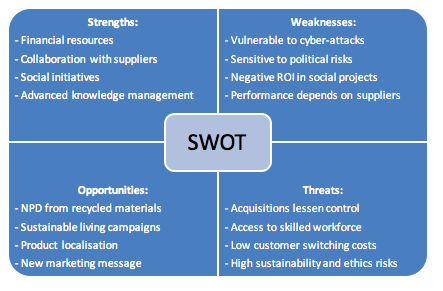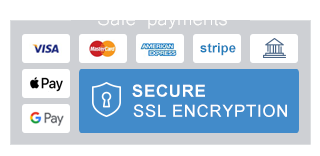SWOT Analysis Example: Unilever
SWOT analysis is a vital tool for quickly establishing the key characteristics of the firm you are researching (McGrath and Bates, 2017). Tutors frequently require implementing this framework in reports and courseworks; so, find below the top 3 tips on running a SWOT analysis.
- Use graphics or tables to quickly summarise your key arguments and points.
- Support your statements with credible academic and online sources.
- Explain the meaning of each bullet point for your company of choice.
The following is an example of how a good SWOT analysis would look for Unilever, a UK-based multinational manufacturer of consumer goods.
Strengths:
- Unilever possesses vast financial resources, which could be used for executing new strategies (Unilever, 2017).
- The company is able to collaborate with its suppliers to develop new products or exploit market opportunities (Laursen and Andersen, 2016).
- Unilever strengthens its brand through social initiatives to benefit the disadvantaged (Varadarajan and Kaul, 2018).
- Unilever relies on a developed network of knowledge management with a high innovation potential (Laursen and Andersen, 2016).
Weaknesses:
- Unilever is vulnerable to cyber-attacks on its IT systems (Unilever, 2017).
- Unilever is sensitive to political instabilities such as Brexit in the UK (Unilever, 2017).
- The company’s social initiatives have frequently failed to achieve the necessary returns on investments (ROI) (Gambhir et al., 2017).
- The firm is severely dependent on the performance of its suppliers (Laursen and Andersen, 2016).
Opportunities:
- New product development (NPD) with a focus on recycled materials (Unilever, 2018).
- Marketing campaigns to popularise sustainable living practices among consumers (Morgan et al., 2018).
- Further product localisation to meet the needs of customers in different countries (Clark and Ramachandran, 2018).
- A new marketing message focusing on the health benefits of Unilever’s products (Ras and Trautwein, 2017).
Threats:
- Unilever uses acquisitions to expand its business portfolio (Unilever, 2017). This lessens the degree of control the company possesses over its processes.
- As a multinational corporation, Unilever (2017) competes for a small number of talented employees in the global markets, reducing labour supply.
- Low switching costs for customers mean that Unilever experiences a high level of competitive pressures (Morgan et al., 2018).
- Any unsustainable or unethical behaviours by Unilever would result in scandals and reduce the quality of its stakeholder relations (Gambhir et al., 2017).
References
Clark, K. and Ramachandran, I. (2018) “Subsidiary Entrepreneurship and Entrepreneurial Opportunity: An Institutional Perspective”, Journal of International Management, to be published.
Gambhir, V., Majmudar, N., Sodhani, S. and Gupta, N. (2017) “Social Return on Investment (SROI) for Hindustan Unilever’s (HUL) CSR initiative on livelihoods (Prabhat)”, Procedia Computer Science, 122 (1), pp. 556-563.
Laursen, L. and Andersen, P. (2016) “Supplier involvement in NPD: A quasi-experiment at Unilever”, Industrial Marketing Management, 58 (1), pp. 162-171.
McGrath, J. and Bates, B. (2017) The Little Book of Big Management Theories, 2nd ed., Harlow: Pearson UK.
Morgan, E., Foxon, T. and Tallontire, A. (2018) “‘I prefer 30°’?: Business strategies for influencing consumer laundry practices to reduce carbon emissions”, Journal of Cleaner Production, 190 (1), pp. 234-250.
Ras, R. and Trautwein, E. (2017) “Consumer purchase behaviour of foods with added phytosterols in six European countries: Data from a post-launch monitoring survey”, Food and Chemical Toxicology, 110 (1), pp. 42-48.
Unilever (2017) “Annual Report and Accounts 2017”, [online] Available at: https://www.unilever.com/Images/unilever-annual-report-and-accounts-2017_tcm244-516456_en.pdf [Accessed on 22 November 2018].
Unilever (2018) “Unilever and Veolia Sign Collaboration Agreement on Sustainable Packaging”, [online] Available at: https://www.unilever.com/news/press-releases/2018/unilever-and-veolia-sign-collaboration-agreement-on-sustainable-packaging.html [Accessed on 22 November 2018].
Varadarajan, R. and Kaul, R. (2018) “Doing well by doing good innovations: alleviation of social problems in emerging markets through corporate social innovations”, Journal of Business Research, 86 (1), pp. 225-233.


